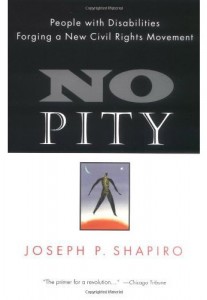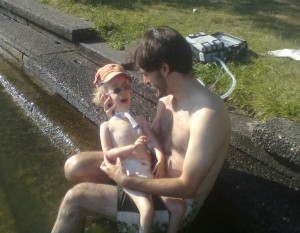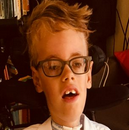Book and Movie Reviews, Part 1 (Aug. 26)
Burke and I have been talking for about two years now about adding a “resources” section to this blog, since we’ve learned so much about parenting and disability from books, magazines, films, friends, and other blogs. But creating an exhaustive list of everything we’ve read has felt too daunting. However, with Lucas napping and a good cup of coffee on hand, I’m finally going to take the plunge.
Or maybe I’ll wade my way in to this, since I’m not sure if I can do justice to the two books I’ve loved the most so far. So for now I’ll just name then, and maybe I’ll say more later. But you should just read them – they’re both memoirs by powerful women who are also awesome storytellers. The first is Too Late to Die Young by Harriet McBryde Johnson. The second is Knowing Jesse: A Mother’s Story of Grief, Grace, and Everyday Bliss by Marianne Leone.
 The book I read most recently is No Pity: People with Disabilities Forging a New Civil Rights Movement by Joseph P. Shapiro. It is an extremely accessible history book about the disability rights movement, and since Shapiro is a journalist, he’s practiced at telling people’s stories. The book focuses mostly on the activism of people with disabilities and their families in the 1960s-80s, though he knows his history going back much further. Everyone who can’t already tell me when the ADA was passed, whether or not deafness is a disability, and what a CIL is should read this book.*
The book I read most recently is No Pity: People with Disabilities Forging a New Civil Rights Movement by Joseph P. Shapiro. It is an extremely accessible history book about the disability rights movement, and since Shapiro is a journalist, he’s practiced at telling people’s stories. The book focuses mostly on the activism of people with disabilities and their families in the 1960s-80s, though he knows his history going back much further. Everyone who can’t already tell me when the ADA was passed, whether or not deafness is a disability, and what a CIL is should read this book.*
Because the author is so good at telling the stories of the activists, organizers, and rabble rousers who have made up the disability rights movement, the book feels very personal. He tells the story of Ed Roberts, a student at UC Berkely who had had polio in the 1930s and then became a quadripalegic. Roberts pushed the UC Berkley, and was the first quadripalegic admited, along with his iron lung. Together with other students with disabilities, he organized for the right to live first on campus (they were only allowed to live in the campus hospital initially), and eventually created the first Center for Independent Living, a space where people with disabilities could hire their own attendants and make their own choices about how they would live.
The book tells the story of the emergence of disability as an identity, and especially as a source of pride in the 1980s. But it also goes back through the ugly history in this country of isolating, institutionalizing, and trying to erase difference and disability. There were major efforts to stop the use of American Sign Language through the 20th century, as hearing “experts” insisted that deaf people could be forced to assimilate through lip reading. Shapiro traces the story of the suppression of ASL and its relatively recent reemergence as a common language for deaf people. The author also tells the life story of his own friend with intellectual disabilities, Jim , who was institutionalized for nearly his whole life, from 1959-1992. Shapiro tells about some of the so-called “behavior modification” techniques that Jim suffered – and certainly compounded his difficulty connecting and communicating – that were acceptable at the time.
The indignity and outright abuse thousands of people with disabilities have suffered in institutions was difficult to read. Though most major state “mental institutions” were closed in the 1980s and 90s, today people with disabilities who cannot afford their own home and personal assistants are still forced into nursing homes and other smaller institutions – where they have little to no autonomy over their own bodies.
The fact that the book ends near Jim’s story is telling. The disability rights movement of the 1960s-90s had epic achievements, both in terms of rights and shifting our national culture toward inclusion of people with disability. As a parent, I am so grateful that Lucas was born now and not 50 or 100 years ago, when the dominant culture shamed families of children with disabilities.
The book also felt incredibly personal since we as a family benefit all the time from the work of these disability rights activists – every time we roll into a library, theater, zoo, aquarium, or up the elevator on the ferry. I felt like I was reading the history of our people. I cried through the chapter on the history of the wheelchair (though it was not written to be a tearjerker). I felt so grateful for the people before us who demanded something better – lighter, faster, easier – than what medical supply companies said was possible.
But of course we still have a long way to go, and I’m dying to read the sequel to No Pity (if anyone has suggestions?). But in many ways it is still being written. The emerging disability justice movement is redefinining the goals of people with disabilities — no longer wanting just “independence” and equal access to a broken system, many disability activists are talking today more about “inter-dependence” and the need to address racial, economic, gender and all other forms of inequality and oppression that co-exist with ablism in our world today. And at the same time, we have a major political and cultural fight on our hands to defend what many of these activists have won in the last half century. I live in fear of the ideology of the extreme (and maybe even moderate) right — each person to her or himself. You only deserve as much as you work. On the contrary, I want to live in a society that provides for people what they need, whether that is wheel chair ramps or sign interpreters or personal assistants around the clock. But with Social Security and Medicaid and many other forms of support for people with disabilities on the chopping block, the future of the victories of the disability rights movement feels uncertain.
But now I’m wading into the territory of writing a book rather than reviewing one! So here’s one more review – a hopeful sequel to Jim’s story.
We just watched “Wretches and Jabberers,” a documentary about two men on the austism spectrum who communicate primarily through typing. (If you have Netflix, you can see it on-demand there.) They were both institutionalized as children, but now they have become advocates and spokespeople for people with intellectual disabilities. The documentary follows them and their two assistants as they travel to meet other people with autism in Sri Lanka, Japan, and Finland. The movie critics don’t seem to love it (based on my quick skimming of reviews) because it’s slow. But the critics miss the whole point. The “jabberers” in the title refers to the rest of us — the people to whom language comes so easily we overuse it. Tracy and Larry work so hard to get each word out that they, and the people they meet in their travels, choose their words with precision, then type them out one slow letter at a time. Tracy and Larry are poets, artists vividly describing their unique perspective and experience of being human. It is absolutely worth it for us jabberers to sit quietly and listen.
Thanks so much to Carol Tyson for helping us find these and more books and resources. She actually compiled a 10-page document for the bookstore at Busboys and Poets in DC – suggestions of books to add to the shelves – which we’ll figure out how to link to soon. And thanks, too, to Lezlie Frye for also helping assemble our ongoing reading list. It is good to have friends.
* Answers: the Americans with Disabilities Act (ADA) was passed in 1990 and signed into law by George HW Bush; some deaf people do consider deafness a disability, some do not; and Centers for Independent Living (CILs) are housing centers for people with disabilities where they are given support to live as independently as possible.





